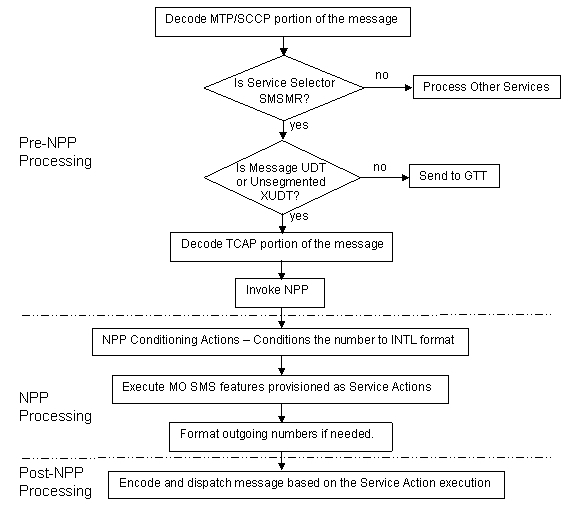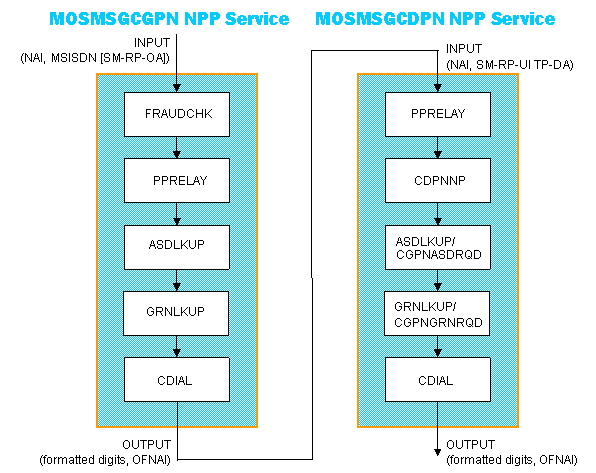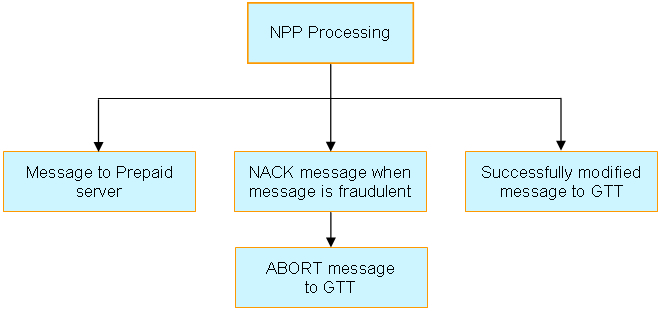Numbering Plan Processor for MO SMS Features
Numbering Plan Processor for MO SMS features (MO SMS NPP) provides comprehensive NPP number conditioning and service logic execution for MO SMS features that support the GSM protocol. The MO SMS features can be selected and sequenced as required without repetitive number conditioning functions. NPP resolves complex number conditioning using a flexible provisioning logic. For detailed information about NPP, refer to Numbering Plan Processor (NPP) Overview.
Numbering Plan Processor for MO SMS features (MO SMS NPP) supports the following features:
-
MO-Based GSM SMS NP
-
Portability Check for MO SMS (MNP SMS)
-
Prepaid SMS Intercept (PPSMS)
-
MO SMS Additional Subscriber Data (MO SMS ASD)
-
MO SMS Generic Routing Number (MO SMS GRN)
MO SMS NPP Message Processing
After decoding the MTP and SCCP portion of the MSU, the
system verifies whether the SCCP parameters of the message match any of the
provisioned Service Selectors. If the Service Selector =
smsmr, MO SMS processing begins. The
TCAP portion of the message is decoded.
NPP-related functions are performed next. The incoming Called Party Number or Calling Party Number is conditioned to international format using Conditioning Actions. All Service Actions provisioned for the NPP Services are performed after verifying whether the feature is enabled and turned on.
After the NPP service functions are completed, the message is directed to post-NPP processing. The message is encoded and dispatched. If the message is redirected to Global Title Translation (GTT), translation can be performed based on the SCCP Called Party Address digits or the TCAP Called Party Number.
Figure 5-14 MO SMS NPP Message Processing

NPP Processing
NPP processing supports both GSM Forward Short Message Mobile Originated (MO) messages. GSM protocol supports MO-Based GSM SMS NP, Portability Check for MO SMS, and Prepaid SMS Intercept.
NPP processing for GSM
NPP processing performed for GSM protocol and possible Service Actions that can be provisioned are shown in Figure 5-15 .GSM protocol supports two NPP Services: MOSMSGCDPN for processing Called Party Numbers and MOSMSGCGPN for processing Calling Party Numbers. The Calling Party Number is processed first. The Calling Party Number is the MSISDN digits of the SM-RP-OA parameter of the Forward Short Message. The Called Party Number is processed second. The Called Party Number is the TP-DA digits of the SM-RP-UI parameter of the message being processed.
Figure 5-15 MO SMS NPP - GSM NPP Processing

Post-NPP Processing
After conditioning the number, performing Service Actions, and formatting the number passed to NPP, the decoded message is encoded and sent to the correct module or destination for further processing. For GSM protocol, several dispositions are possible:
- The message can be sent to a Prepaid Server after PPRELAY Service Action processing.
- The message can be NACK if the FRAUDCHK Service Action determines that the message is fraudulent.
- The message can fall through to GTT after CDPNNP Service Action processing.
Figure 5-16 Post-NPP Processing

UDR Lookup for NPP Services
An entry for a conditioned number can be found in either an Individual DN UDR Table or a range DN UDR Table. If an entry is found in the Individual DN UDR Table, the range DN table is not searched. An Individual DN Table entry has precedence over a range DN Table entry. Most NPP Service Actions require an UDR Lookup result. For a given NPP Service, UDR Lookup is performed only once. This UDR Lookup is performed by the first Service Action that needs an UDR Lookup result.